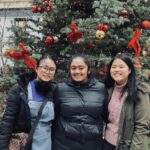For students with language-based learning disabilities, finding a school that understands and appreciates how they learn can be a difficult and stressful process. Fortunately, Ady Tibrewal’s parents found Landmark School in Massachusetts.
“Landmark’s style of teaching and intervention programmes felt right for me, and my parents felt I could actually learn here. The environment was wholesome and amazing. It wasn’t just the beautiful campus, but my fellow students were warm and friendly as well,” Tibrewal from Kolkata, India, enthuses.
Unlike Tibrewal’s previous school in India, Landmark’s kind and approachable faculty engaged and nurtured him, instilling a strong sense of community, belonging, and trust.
Indeed, Landmark – a traditional college preparatory school – provides a safe and supportive learning experience for students with dyslexia and other language-based learning disabilities. Sunaina Hoon, also from India, calls Landmark “home.”
“I was homesick at the beginning of my freshman year because everything was new, but everyone at Landmark was so kind,” she says. “The teachers, my houseparents, and friends went out of their way to understand me and make me feel welcome and important. I can talk to my houseparent, Mama O, about everything — and I do.”
Classes feel just as comforting. “My teachers totally get me and understand how to teach me. They encourage me to ask questions and ask for help. I’ve become so much more independent here,” Hoon shares.
For both Tibrewal and Hoon, what has helped them the most is Landmark’s personalised curriculum. Each student is provided a daily, individualised one-to-one tutorial in addition to small classes facilitated by faculty specially trained in teaching students with dyslexia, executive function deficits, and attention issues.
“We know what works for students who have struggled in traditional classrooms. At Landmark we help them discover talents, cultivate strengths, conquer challenges, develop independence, and fulfill dreams,” Bob Broudo, head of school, explains.
That is why an impressive 100% of Landmark’s graduates are accepted into college. Many enter top universities in the US and worldwide, including Queen’s University in Canada and Temple University in Japan.
Landmark has certainly come a long way since it opened its doors 50 years ago. From the original Massachusetts campus of 40 students, the school has expanded to include two North Shore sites, with 470 students and a faculty and staff of 320.

Students diagnosed with dyslexia and other language-based learning disabilities thrive academically and socially in Landmark School’s safe, nurturing environment. Source: Landmark School
Landmark’s proven teaching methodology, a research- and evidence-based approach, has helped thousands of students find their footing, confidence, and independence.
“Our primary focus has been serving students in grades two through 12 with dyslexia and other language-based learning disabilities. We are a mission with a school: outreach and training for educators and research collaborations that ensure that what we do is validated, credible, and works,” Broudo says.
Another winning strategy is Landmark’s Transition Programme. Each student is assigned a guidance counsellor who helps them explore their post-secondary options and build a résumé. Planning begins freshman year and continues through senior year (grades nine to 12). The Transition Programme helps students identify their interests, understand their learning disability and style, and prepare for college and beyond with self-advocacy and related skills.
Landmark’s guidance office offers individualised and dedicated support each year; junior year students have weekly meetings with their guidance counsellor to research their next steps after graduating from Landmark. The department then selects colleges, universities, and post-secondary programmes that best match the needs, talents, and expectations of students.
Amira Ghobrial is one such success story. She recently graduated with an economics degree from Queen’s University, a leading public university in Ontario, Canada.
“We’re so grateful to the Landmark teachers who prepared her to have such a successful ending at Queen’s University,” says her mother Hala Ghobrial, adding that because of these teachers, Amira had a productive, positive, and rewarding high school experience at Landmark.
Honing soft skills, nurturing leaders
Landmark offers a wide range of robust electives and extracurricular activities. For example, students can participate in athletics, visual and performing arts, woodworking and technology, among many others.
“My outdoor leadership class taught me how to behave as a leader in a tough environment. It challenged me in ways I never could have imagined, and helped me learn how to solve problems and hone my communication and interpersonal skills,” Tibrewal says, adding that he has become more adventurous.
Landmark’s three programmes – Expressive Language, Founders, and Prep – help students struggling with language skills beyond preparing them for college. In particular, the Prep programme, suitable for those with ADHD and difficulty with executive function, includes effective organisational strategies and study skills in all classes and subjects.
Whatever class or programme they’re in, international students at Landmark feel welcome and a sense of belonging. For Tibrewal and Hoon, they felt they were truly understood — at last — by their teachers, houseparents, and friends, something they had never experienced back home in India.
Hoon sums up this best about Landmark’s life-changing approach: “Landmark has helped me reach my best potential, teaching me skills and helping me improve over time. I can feel the difference and how I have changed as a learner. I thrive in my new environment.”
Follow Landmark School on Facebook, Twitter, Instagram, YouTube, LinkedIn and Blog










